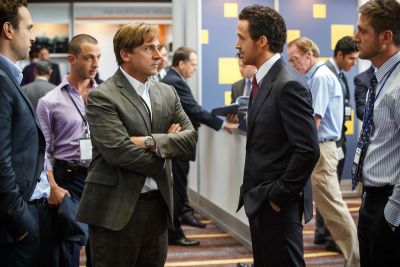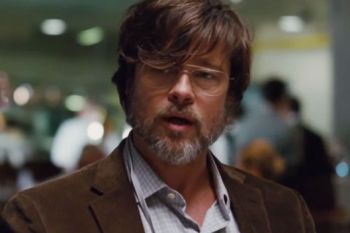
By Elias Savada.
Mention the words “subprime mortgage” and people start dozing, or leave the room.
Hey, you! Yes, you! Wake up. And your friend, get him back in here! Because both of you, my favorite readers, really want to learn about the fine new educational and entertaining film from Adam MacKay. The Big Short is a grandly eccentric, darkly comic approach to the subprime mortgage (wake up!) collapse that rocked the financial world back in 2008.
Did I say “fine” and “Adam McKay” in the same sentence? Yup. He was the man in the director’s chair for the very funny Anchorman (2004) and the lesser absurdist movie Step Brothers (2008), but he strained the audience’s appreciation of his work when he produced the dreadful Hansel and Gretel: Witch Hunters (2013). Which wasn’t a comedy at all. Yet two years removed from one of the worst films of that year, McKay has put together a whimsical and fascinating look at the world of finance that anyone can understand. Yes, that includes both of you.
The Big Short is one of those genre-bending films. A serious drama with very unconventional touches and outlandish soupçons of wit and wisdom. Such as having the gorgeous actress Margot Robbie, sipping on champagne in a bubble bath, explain the finer aspects of the mortgage business. Selena Gomez has a similar, captivating sidebar (sans bubbles) about the odds of winning with synthetic CDOs (collateralized debt obligations: see the movie – you’ll learn a lot!) while hitting the tables in Vegas. Chef Anthony Bourdan slices and dices during a mini-seminar, too.
Or, you can look at it as a faux documentary, complete with hand-held pull focus and “home movie”-style snippets, as the filmmaker follows the various outsiders, contrarians, weirdos, and a few cool guys who saw the financial end coming.
Finally, it could be a manic screwball, Shakespearean tragicomedy fueled by double shots of adrenaline, one that makes your brain wobble from information overload. The Golden Globes (four nominations) has seated the film in the musical-comedy genre.
 McKay has created a unique movie for this holiday season, with the help of a script he wrote with Charles Randolph (2010’s Love & Other Drugs), which was based on the well received Michael Lewis book The Big Short: Inside the Doomsday Machine (2011), a layman’s guide to the early 2000s build-up of the housing and credit bubble, which sat atop The New York Times non-fiction best-seller list for half a year. Lewis had previously provided the source material for such award winning films as Moneyball (2011) and The Blind Side (2009), so the odds already looked favorable even before filming began. Stir in an ensemble cast moored by Christian Bale, Steve Carell, Ryan Gosling, and Brad Pitt (also one of the the producers), and there’s magic in the air.
McKay has created a unique movie for this holiday season, with the help of a script he wrote with Charles Randolph (2010’s Love & Other Drugs), which was based on the well received Michael Lewis book The Big Short: Inside the Doomsday Machine (2011), a layman’s guide to the early 2000s build-up of the housing and credit bubble, which sat atop The New York Times non-fiction best-seller list for half a year. Lewis had previously provided the source material for such award winning films as Moneyball (2011) and The Blind Side (2009), so the odds already looked favorable even before filming began. Stir in an ensemble cast moored by Christian Bale, Steve Carell, Ryan Gosling, and Brad Pitt (also one of the the producers), and there’s magic in the air.
The scorched financial earth storyline follows various factions which are convinced of the economic apocalypse that awaits the world because of Gordon Gekko greed and arrogance. Dour San Jose money manager Michael Burry, M.D. (Bale), a former neurosurgeon with a glass eye (and an uncanny knack for numbers) is also a very peculiar fellow. He personally peruses the thousands of home loans in 2005 that are grouped into mortgage bonds adored by the banks. He’s convinced they’re junk. So he creates an amusing item called the credit default swap that bets against the housing market. $1.3 billion worth. The owners and investors of his hedge fund think he’s crazy as he waits (and waits some more) until the bottom drops out.
Meanwhile….
Ryan Gosling talks to us. He’s our guide through the money maze, and also plays the role of Jared “Chicken Little” Vennett, a Wall Street subprime mortgage guru based on a real person named Greg Lippman. Vennett learns of Burry’s scheme and gets the frantic, energetic, and irritatingly brash Mark Baum (Carell, playing a fictionalized version of Steve Eisman) on board to invest his hedge fund’s money in similar swaps. Baum’s won over when his anxious associates discover housing market shenanigans afoot in Florida. The Sunshine State is becoming the American financial Chernobyl: homes for sale, homes in foreclosure, homes bought in the name of family pets, homes owned by strippers and too many immigrants without a clue. And alligators squatting in abandoned swimming pools.
While….
Jamie Shipley (Finn Wittrock) and Charlie Geller (John Magaro), fresh out of Economics 101 and Boulder, Colorado, bring to the party their small $30 million fund (up from a $110,000 start), but find that isn’t nearly enough capital to sit at the adult hedge fund table ($1.5 billion required, gulp). So they get help from a heavily bearded recluse doomsayer Ben Rickert (an equally disguised Brad Pitt) to help the young lads play (big) money ball.
So….
Sure, we know the mortgage bubble blew a huge hole in our confidence in governance and government oversight, despite the warning (courtesy of Mark Twain) that “It ain’t what you don’t know that gets you into trouble. It’s what you know for sure that just ain’t so.” There’s more: the investment bankers are in bed with the rubber stamping bond rating agencies, too. (Melissa Leo has a quaint, justice-is-blind cameo in this segment.) So there’s a bit of constipation before the honey money pot finally tips fully over.
The Big Short is one intense ride. It’s a sad, maddening smorgasbord of mean-spirited, indifferent people looking out for their own asse(t)s. Comeuppance is a bitch.
Elias Savada is a movie copyright researcher, critic, craft beer geek, and avid genealogist based in Bethesda, Maryland. He helps program the Spooky Movie International Movie Film Festival, and previously reviewed for Film Threat and Nitrate Online. He is an executive producer of the new horror film German Angst and co-author, with David J. Skal, of Dark Carnival: the Secret World of Tod Browning.
